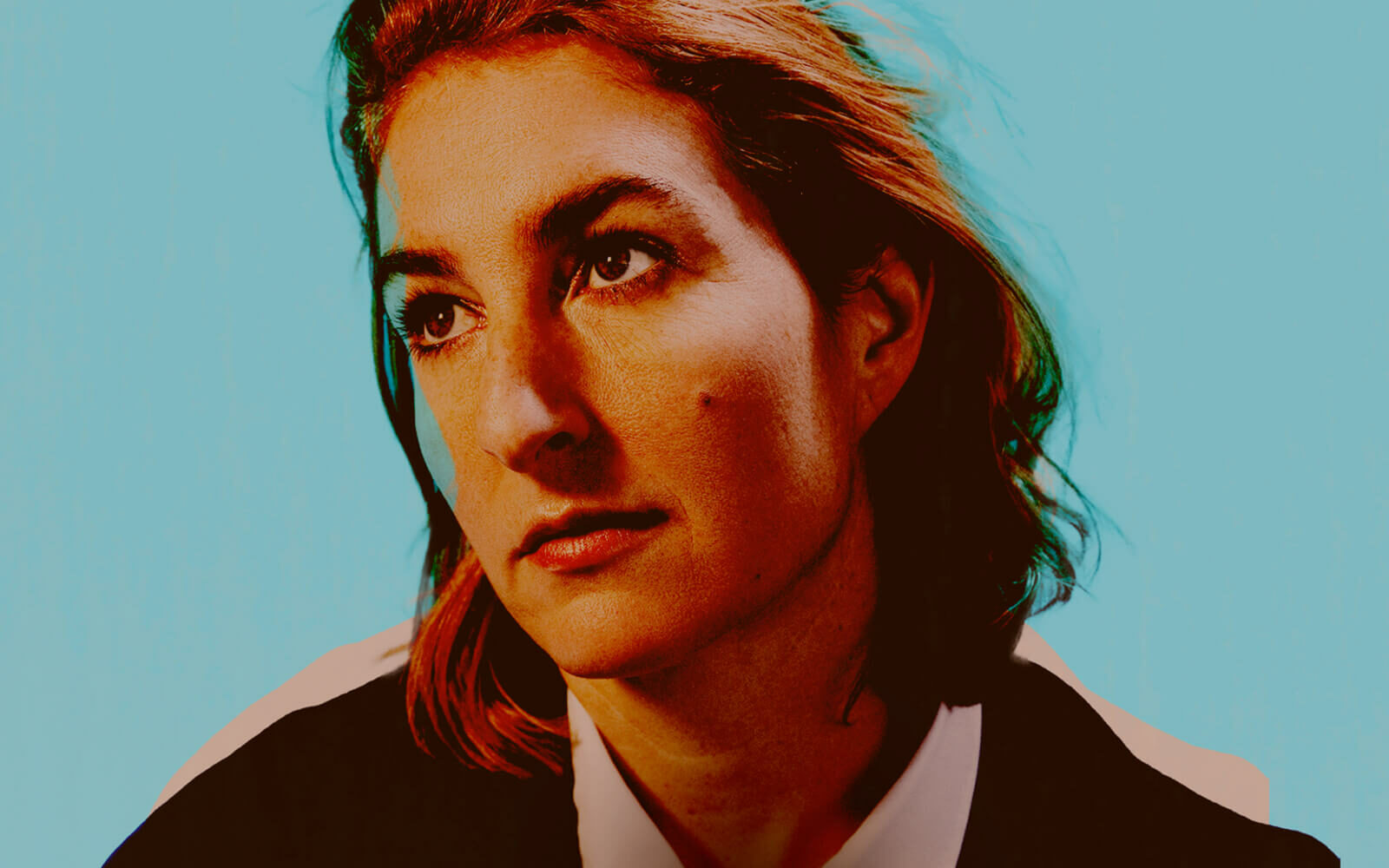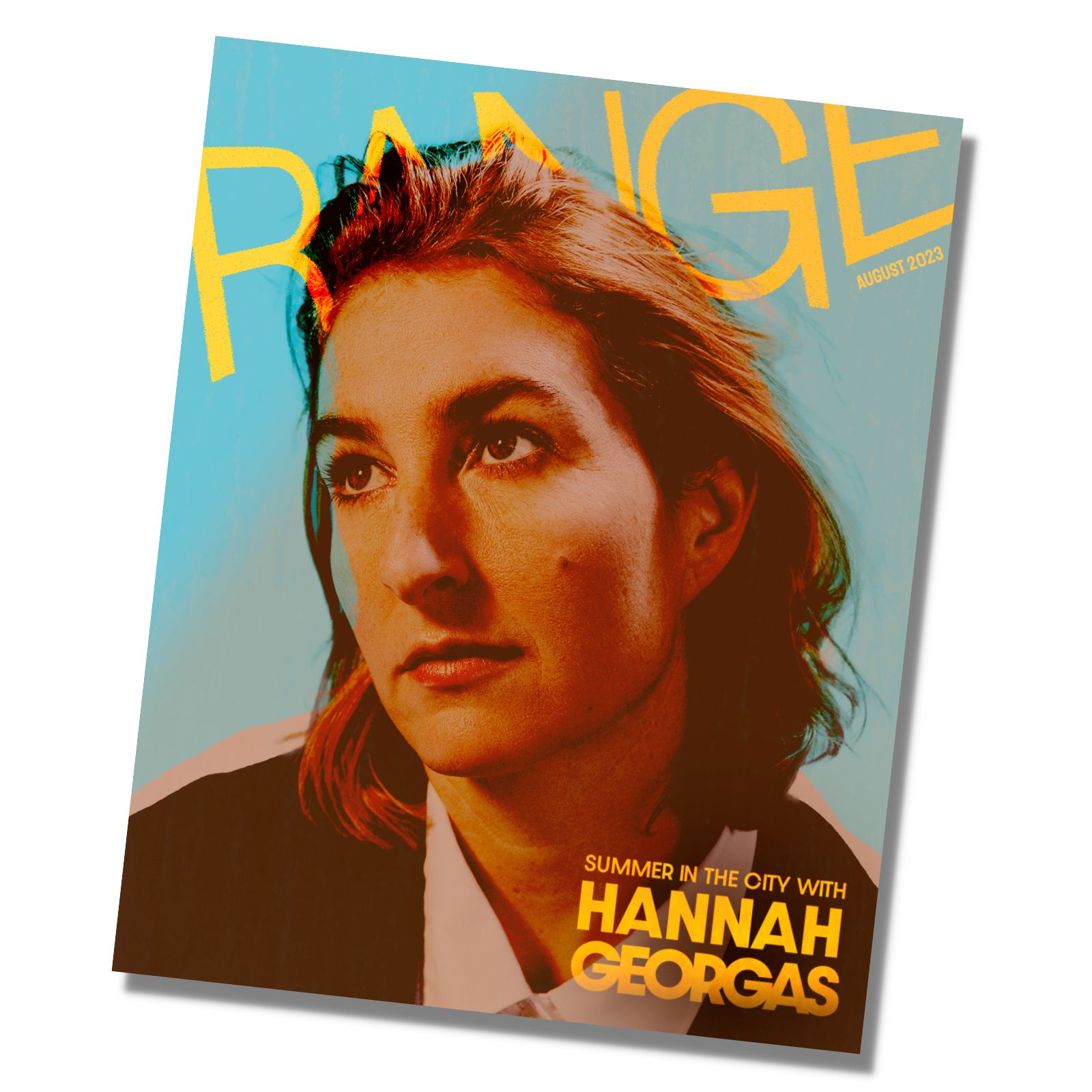By Cam Delisle
In the wake of her breakthrough third album, Through The Wall, the experimental-R&B auteur reflects on a career-defining year.

Hannah Georgas and I are in Midtown Toronto on a July evening, and the humidity feels inescapable. The gelato we tried to eat earlier quickly turned to soup, and so we seek refuge from the heat under the abundant trees of a nearby cemetery.
In a city with minimal green spaces, this spacious cemetery is a hot spot for fitness and nature enthusiasts alike. As Georgas and I sit on a wooden bench and talk, there is a steady stream of people walking, jogging, or cycling by on the paved road that winds through the grounds. At one point I spot a white security car doing its usual rounds, but before we know it the living have emptied out of the cemetery without us noticing.
Georgas drove to Toronto from her home in Belleville, Ontario; a small city (its population hovers around 60,000) located a couple of hours east. A day before the world shut down in 2020, Georgas released the first single from her fourth LP, All That Emotion. The rest of the story has become a familiar one: the album release cycle was upended as Georgas’ tour plans were cancelled. She fell into a creative slump and decided to move out of Toronto, first renting a home in Prince Edward County before settling in Belleville with her partner Sean Sroka (Ten Kills The Pack).
“I started to feel like I had grown out of the neighbourhood that I was living in in Toronto, and the pandemic really escalated that feeling,” she explains.

Georgas grew up an hour north of Toronto in Newmarket. She fell in love with music at an early age, but her parents were not overly supportive of her desire to become a professional musician. At 18, Georgas moved to Victoria to study psychology at university, but she was unhappy there and started to suffer severe anxiety attacks. “That was the thing that made me think, ‘Okay, you have to trust your gut and go for music. Do it or just forget about the whole thing,’” says Georgas.
With a jump into the unknown, Georgas relocated to Vancouver, BC. She didn’t know anybody in the rainy west coast city, but started going to open mic nights by herself, even waiting until 1 a.m. for her spot to sing on some nights. Driven by her passion while eventually finding a musical community among the crowd, her career started to take shape.
Since releasing her debut EP, The Beat Stuff, in 2008, Georgas, among various other accomplishments, has put out four critically acclaimed full-length records, earned five nominations at the Junos and three Polaris Prize nominations. She has gone from singing a song called “The National” (a track from The Beat Stuff) to being part of The National’s touring band in 2019; band leader Aaron Dessner even produced her 2020 album, All That Emotion.
It doesn’t take long for me to admit to Georgas that The Beat Stuff and her debut LP This is Good were formative influences for me. Later, when I tell my friend Madeleine that I interviewed Georgas, she characterizes those early releases as “the soundtrack to our youths.”
“I’m proud of little Hannah,” says Georgas, reflecting on her 15-year career. “It took a lot for me to get going with music. I didn’t know anybody on the west coast, not a soul, and I left home when I was 18 years old. Would I do something like that now? I don’t know, but I was just so excited to be doing music. And I think that as the years have gone on, I still feel very passionate, but it has shifted a bit. A scepticism has grown a bit in me. But I feel proud of my past self.”
At the cemetery, Georgas laughs easily in conversation and is dressed effortlessly cool in ripped jeans, a black t-shirt, white sneakers, and a red baseball hat. When she asks you questions, you feel like she genuinely cares about the answers. And the thing is, Georgas actually does care. So much so that she named her new record I’d Be Lying if I Said I Didn’t Care.

Georgas, alongside Sroka, co-produced her record, which marks the first time that Georgas has been in that role—but she’s always had an interest in constructing her songs. When making demos, she records guitar, piano, and vocals and is always accompanied by her treasured OP-1, a multi-purpose synth that she uses to explore electronic textures and drum beats. When a scheduling conflict caused the producer that Georgas had originally lined up to back out of her record, she decided to give herself the opportunity to dig deeper into the sounds that she’s naturally drawn to.
“I just really like my demos and I wanted to give myself a bit more credit for them and not get rid of the sounds that I like. They are sounds that I chose for a reason and I’ve just always, after the fact, wondered what it would be like if I tried producing,” says Georgas.
I’d Be Lying if I Said I Didn’t Care is a record about self-worth and self-awareness. It’s full of poppy rock with subtle electronic touches, but sparser tracks like “Scratch” or “Virgo in Me” find Georgas playing limited instruments and being more vulnerable than ever. There’s an affirmation on the album’s hushed closing track, “Keep Telling Yourself,” that feels central to Georgas’ headspace when writing this record: “I want to be everything I deserve.”
“Throughout my life, I’ve felt that I’m trying to prove something,” Georgas says. “Music is a lot about proving yourself, and the ups and downs of that, and the anxiety I have around it was all bubbling to the top when I started writing this record. A lot of the record touches on how sometimes I feel like I’m in my own lane, and I can do whatever I need to do, and you can’t say anything about it. Sometimes I think, ‘Am I going to be okay? This is really hard.’”

Georgas often wrestles with her doubts, and at one point she describes herself as “fragile.” But what feels like a constant in our conversation is how her many self-discoveries have been through action. Whether it was moving to Vancouver to start her music career or producing for the first time, Georgas was nervous, sure, but she did it anyway.
“I can do whatever I want and be whatever I want to be and work with who I want to work with,” she concludes. “I think that when I first started out making music and trying to figure out things, I thought that I needed to work with someone to make my stuff be something and I never knew that I could actually do it myself. I’m thankful for all of the experiences that I’ve had, but for this record in particular, I wanted to take things into my own hands and trust my instincts and go for it. I think that’s one big thing that I’ve learned in my career: things are possible and you can do it.”
Georgas and I get up to make our way out of the cemetery, chatting about the desire that I have to also leave Toronto eventually and move to somewhere quiet in eastern Ontario. When we approach the black metal gate at one of the cemetery’s entry points, we see that it’s secured shut by a rusted chain with a padlock. A couple approaches us and says they tried leaving another way but discovered that the gate was also locked. I suggest we try a main entrance off of a busy street. “You need to write about this,” laughs Georgas.
On our way to the other entrance, I point out a few crumbling stone blocks abutting the six-foot tall iron fence and jokingly say, “If we’re locked in, we can try to climb up over there.” When Georgas and I arrive at the other entrance, we discover that it is also locked and alert the couple trailing behind us. Stunned that security didn’t do a sweep of the grounds before locking up for the night, we head over to the stone blocks and, among nervous giggling, we start strategizing our escape.
With the help of a sympathetic stranger passing by on the sidewalk (“I got locked in last Halloween,” he explains), Georgas manages to climb over the fence with an ease that I do not possess. “Are you comfortable doing this?” Georgas asks with concern as I unsteadily sit on top of the fence. I am not, but I let Georgas’ words wash over me again – “Things are possible and you can do it” – and I jump.
I’d Be Lying If I Said I Didn’t Care is set for release Aug. 25 via Arts & Crafts | MORE INFO

By Cam Delisle
In the wake of her breakthrough third album, Through The Wall, the experimental-R&B auteur reflects on a career-defining year.
By John Divney
Still processing their debut album, Vancouver’s latest art-rock unit proves collaboration is the new rebellion.
By Cam Delisle
The elusive Kevin Parker soundtracks the self-medicated search for bliss on his fifth album, Deadbeat.